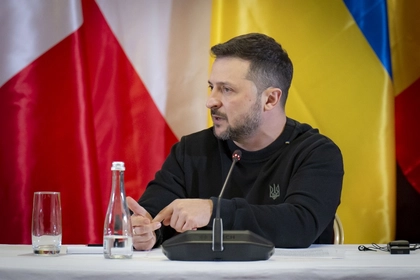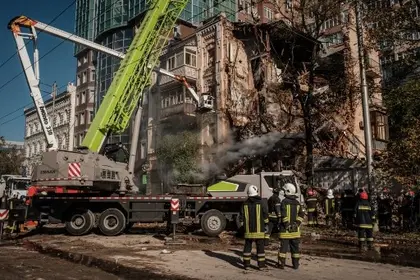The Russian military is increasingly deploying “kamikaze” drones in its attacks on Kyiv and other Ukrainian cities. These unmanned aircraft equipped with missiles are purportedly being supplied by Iran, although Tehran denies this. Europe’s press discusses how their use could affect the course of the war.
Today, Europe’s press debates the ongoing Russian invasion of Ukraine. Here are some opinions from a selection of European publications, presented by eurotopics.
JOIN US ON TELEGRAM
Follow our coverage of the war on the @Kyivpost_official.
Tehran’s support will come to an end
Such support will not withstand the pressure from all sides for long, says Spotmedia:
“Iran is in a dilemma. With a political regime under pressure from protests, targeted by US and European diplomats and receiving subliminal threats from Israel, it is difficult to imagine that it will continue to help Russia. And even if it does, the shipments will be sporadic and not meet Russia’s immense demand. Meanwhile, the Ukrainian armed forces are preparing for the delivery and upgrade of systems that can intercept Iranian drones so that they no longer pose a threat to the population.”
Ukraine pinning its hopes on Israel
Jyllands-Posten sees the conflict expanding:
“The Israeli government has so far stayed out of the conflict out of concern for the safety of Jews in Russia. But Russia’s use of drones will increase Iran’s experience with these deadly weapons. This means that Israel, with an eye to its own security, may also become interested in gaining more experience with air defence systems against the drones, as the Jerusalem Post explains. This is apparently what Ukraine is hoping for. According to several Israeli media, the Ukrainian government plans to ask Israel again for air defence systems.”

Zelensky Criticizes G20’s Weak Position on Russian Invasion
Pure retaliation
Telegram.hr sees parallels to Hitler’s tactics in Russia’s use of drones:
“’Our goal is not to destroy all of Ukraine,’ Russian President Vladimir Putin said as he continued to attack the Ukrainian capital Kyiv. Just as Hitler’s V1 flying bombs once zoomed over London, Shahed-136 kamikaze drones are attacking the Ukrainian capital now. Hitler, however, had manufactured his terror weapons himself, while Putin personally begged Iran for them. … Apart from causing major damage, the Iranian drones can’t really influence the outcome of the war. … But the threat to Ukrainian civilians is serious.”
Time for a united and swift reaction
Iran’s cooperation with Russia must be nipped in the bud, stresses The Times:
“Israel will soon have to make a choice. A Russian-Iranian military industrial complex, allowing Tehran to bankroll the rapid enlargement of its drone force and export them to proxy militias on Israel’s borders, poses an existential threat. Like many Nato members, Israel exchanges intelligence with Kyiv. It can do more. America should offer its Nasams surface-to-air missile system to shield Ukrainian cities. Britain has Amraam rockets that can shoot down Iran’s kamikaze drones. The sooner these are deployed the better.”
Iran will get something in return
The conflict now threatens to expand, La Repubblica fears:
“Iran has handed over its drone stockpile to the Russians and is preparing to hand over ballistic missiles as well. But the massive transfer of weapons from Tehran to Moscow opens another worrying front: what has the ayatollahs’ regime been promised in return? …. There is a hypothesis circulating in Western intelligence circles: Moscow could offer Tehran the technology for hypersonic missiles. That would pose a direct threat to Israel.”
Israel abandons neutrality
Iranian drones are a good reason for Tel Aviv to rethink its stance, says Gazeta Wyborcza:
“Iran’s involvement worries the West. … Israel also fears that Ukraine will become a testing ground for Iran to perfect its military technology and use it against Israel later on. Iran is also arming the Hezbollah militants with the same equipment as it is supplying to Russia, and they have already used such drones against Israel. When the information about Iranian missile deliveries became known, Tel Aviv apparently decided to break with its policy of neutrality towards Russia’s aggression against Ukraine.”
Freeze negotiations with the ayatollahs!
El Mundo calls for more pressure on Tehran:
“The magnitude of the human rights violations in the country was reason enough for Europe to issue a harsher warning to Iran, which, however, will only come into effect if Tehran’s involvement in the Ukraine war is proven. Because that would violate the Security Council resolution that paved the way for a nuclear deal in 2015, which is currently being renegotiated. It’s time for the West to freeze all dialogue with the ayatollahs’ regime and make its continuation contingent on respect for human rights and an end to participation in Putin’s war.”
Little will to impose real sanctions
So far the EU has only done the absolute minimum with its punitive measures for human rights crimes in Iran, the taz criticises:
“Neither were the notorious Revolutionary Guards put on the EU terror list, nor were sanctions imposed against the highest rulers in the regime. Luxembourg’s Foreign Minister Jean Asselborn even admitted on the fringes of the EU foreign ministers’ conference that only ‘a few individuals’ had been sanctioned. Tough sanctions will be imposed if it is confirmed that the Iranian regime is helping Russia militarily in its war against Ukraine. So you see: it would work if they wanted it to. … But the persecuted people in Iran who are protesting for human rights and freedom are not important enough for the EU to want it. They continue to be persecuted and killed.”
You can also highlight the text and press Ctrl + Enter






